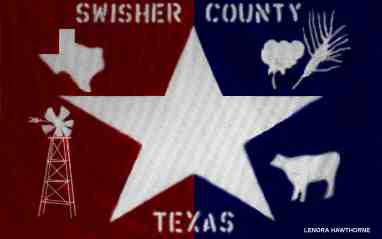Some time ago, I placed a story called “Light and Hitch” written by Laura V Hamner, given to me by relatives to find out where it originated from. I later got an email from a visitor who gave me the answer I was looking for:
Sharon –
I am now 63 years old and I live in Lexington, KY. However I was born in Borger and spent my early years in Moore County. My dad worked at the Shamrock refinery and we lived in company housing until 1949 when we moved to Dumas. My folks owned some farm land in Moore county, and when they died, they left it to me. So I still am actively involved in Panhandle life, only from a great distance.
I remember as a boy hearing Laura V. Hamner do her radio shows over KGNC. As I recall she lived in the Herring Hotel, and I think she was an elderly woman when she did her programs. I have no idea how many programs she made, but I used to enjoy them tremendously. It gave me a certain sense of pride in my place and a link with the past.
There was another Texas radio show I can recall done by Boice House which started out “I give you Texas and the great Southwest”. Maybe you heard it as well.
My mother’s family came from around Dallas, and my mother was the only member of her family who ventured as far west as the Panhandle. She went there about 1933 to become a school “marm” in Borger where she met my dad who was an Oklahoma emigre, working in the oil field. It turned out to be a good match for me at least. They married in 1934 and remained married until she passed away in 1977. My dad died the next year. They both loved the Panhandle and they are now buried in Dumas.
I wish I could tell you more about Laura V. Hamner, but I just don’t know much more than this.
Thanks for posting the story on the WEB.
– John L Rodgers, Jan 27, 1999″
Now that there is an increase of the number of individuals, businesses, and associations on the internet, there is more online about Laura Hamner. You can read more about here at the Texas State Historical Association website. I’d love to get a hold of the books they mention, especially “Light and Hitch.” She’s also been listed in Wikipedia.
Obituary
“HAMNER, LAURA VERNON (1871-1968). Laura Vernon Hamner, public official, writer, radio commentator, and ranch historian, daughter of James Henry and Laura Lula (Hendrix) Hamner, was born on July 17, 1871, in Tennessee. She was educated at Miss Higbee’s School, Memphis, and Peabody Normal College, Nashville, studied further in Texas colleges and the University of Chicago, spent many years in the teaching profession, and subsequently was postmaster at Claude (1913 to 1921) and Potter County superintendent of education (1922-38). She was a Methodist.
Around 1892, when she assisted her father in newspaper work in Claude,Texas, Miss Hamner knew Charles and Mary Ann Goodnight; she later wrote a novelized biography of Charles, The No-Gun Man of Texas (1935). Many years of primary research into life stories of old-timers gave impetus for her books Short Grass and Longhorns (1943) and Light ‘n Hitch (1958). Short Grass has become a classic. For over thirty years Laura Hamner wrote features for the Amarillo Globe-News-“Talks to Teens,” “Panhandle Scrapbook,” and others. She also gave a weekly radio talk on old-time Panhandle life. In 1947 she published an article about Matthew “Bones” Hooks, a black Amarillo cowboy, in Readers’ Digest. Besides breaking ground in research when many insisted the Panhandle had no history, she spurred others to literary efforts. With a friend, Phebe K. Warner, she founded Panhandle Pen Women in the 1920s.
For over thirty years she lived in the Herring Hotel, Amarillo, keeping open house for literary agents, publishers, writers, and would-be writers from many parts of the world. She was never married. She lived on a land claim in No-Man’s-Land (Oklahoma); she adopted a child; she sat on village curbstones and interviewed superannuated cowboys; she braved gunfire to interview a former outlaw. Associates gave her such tributes as honorary membership in the Daughters of the Republic of Texas and municipal observances of “Laura V. Hamner Week.” Indeed, for a time she was known informally as “Miss Amarillo.” She died on September 20, 1968, while with a relative in Alabama, and was buried in Claude beside her parents. Most of her extensive Texana papers are in the Panhandle-Plains Historical Museum in Canyon, though some are in the Barker Texas History Center at the University of Texas at Austin.”
Other Resources:
Websites:
A Guide to the Laura V Hamner Papers, 1890-1963, Briscoe Center for American History
Our History: Our Founder, Panhandle Professional Writers
Some of her Works:
“Light ‘n Hitch: A Collection of Historical Writing Depicting Life on the High Plains, 1958.
“My Mother Talks of Substitutes: Echoes of the Civil War That Are Most Interesting In These Times of High Prices,” 1919
“Prairie Vagabonds,” 1955
“Shade’s Well: The Chronicles of Oklahoma 35,” Spring 1957 (Actual Text Online)
“Short Grass and Longhorns,” 1943, 1942, 1966
“Somebody Might Come: A Story of Modern Southern Hospitality in the Hills of Alabama,” 1958, 1973, American Guild Press, Dallas.
Sump’n Walked Across My Grabe: A Negro Dialogue that Barely Escapes Being a Monologue,” 1929
“Panhandle Pioneers: Texas Wagon Yards Scene of Bustling Activity” 1944 (Actual Text Online)
“The No-Gun Man of Texas: A Century of Achievement, 1835-1929,” 1935
Library Holdings About or Mentioning Her:
Laura V. Hamner : A Woman Before Her Time by Myra Dorris Hall (Book)
Laura Hamner (Archival Material, File Folder)
Biography — Hamner, Laura (Archival Material, File Folder)
Louise F. Day Oral History Interview by Louise F Day (Recording)
Papers, 1966 by Robert C Huckabay (Archival Material, Microfilm)
Texas Humoresque: Lone Star Humorists From Then Until Now by Charles Leland Sonnichsen (Actual Text Online)
Articles:
A Look Back at Christmases Past, Amarillo Globe News
It’s All Trew: Versatile Barbed Wire Also Carried News of the Day, Amarillo Globe News
Tripp: Author on a Roll with 15th Book, Amarillo Globe News, Amarillo Globe News
Tripp: Family’s Story Reminiscent of Small Town Newspapers, Amarillo Globe News
Tripp: The Happy Experience of Being Included in Her Circle, Amarillo Globe News
Woman’s Contributions Example of Pioneer Heritage, Amarillo Globe News
Here is the story I posted and if you have any more information to add, please let me know by emailing the address in the photo above or as a comment to this page. Please note that if you comment to the page, it will not show up immediately to keep spammers from abusing it.
Light and Hitch
NO. 402
JANUARY 14, 1951
MUSIC: Theme: HOME ON THE RANGE…UP…FADE…REMAIN IN BACKGROUND UNTIL CUE TO CHANGE
ANNOUNCER (AGAINST MUSIC): A dramatic portrayal of old and new days by Laura V. Hamner who knows and loves the Panhandle.
MUSIC: Theme: (HOME ON THE RANGE) UP…. and…OUT
ANNOUNCER: Last Sunday you went to the quiet little town on the Santa Fe, Miami, and visited the home of Mrs. Ivy Pursley who was four different years crowned Queen of the Mobeetie Tournament, the highest honor any girl could win. Let’s go again with Laura V. Hamner.
LAURA V. HAMNER:
Thank you, Al Evans, my announcer, and thank you, Bob Nathos, at the controls.
Hello, folks of the Panhandle. For years I have wanted to “Light and Hitch” at Kress, but did not have the opportunity. Today we are going there. We are the guests of Carl Losson, Mrs. Buel Graham, Mrs. J.T. McDaniel and others, but we are not going to stay with them long. We are on our way to the home of Mrs. J.F. Moore, who is a Skipworth. In Kress if you are not a Skipworth, or a Bagley, or a Wood, you are looked on as a new comer, no matter how long you have been there.
But you will not doubt that Mrs. Moore belonged to the Skipworth clan for there will be several sisters and relatives, all bearing the Skipworth brand, waiting for us at the Moore home. That is the Kress of today.
But let’s go back to a day when Kress had not been dreamed of, when there was not even a dugout in sight of the present town of Kress.
Down in Clay County the family of Skipworth was getting restless. Cattle were in the Skipworth blood and not cotton. They wanted to move westward and run cattle and never get another fleck of lint on their fingers. The eldest Skipworth, “Grandpa” W.G. Skipworth, talked the matter over with the boys, and all agreed that this was the time for a Skipworth exodus to the high plains. They all got together several covered wagons and moved. Grandpa led the way, of course, then came Finis and Tom and Jim and young Frank Moore with his bride, Nettie Skipworth. They filed near each other, thus preempting a large trace of land practically in a body.
This was the spring of 1891. Frank Moore decided on land near a man named Abel. To have a neighbor would keep Nettie from being so lonely and make her feel that this land was not so barren as it looked when she sat on top of their dugout and looked across the prairie.
Frank did not want Nettie to be lonely for this was their honeymoon, a season to remember happily all their long lives. He wanted it to be a perfect memory.
Never has Nettie Skipworth Moore forgotten that honeymoon, but not because of its perfection. Frank was perfect, but weather entered into the situation and gave her memories that are keenly alive, even today.
Rain, rain, rain. The roof to their new dugout leaked. Rain, rain, rain. Her pretty little wedding gifts were splashed with mud that dripped into the room. Rain, rain, rain. Their dugout was between two lakes, and those lakes met their nice dugout in the middle on an island. Frank heaped dirt up all about the edge of the dugout, but the water washed the fresh dirt away. Their chickens were drowned.
At last Frank and Nettie got on the same horse “Old Gray,” and went to the home of a neighbor by the name of …… Guess what? That’s right. Smith! That was a June to remember, “Brother Jim” Skipworth was taking a sack of flour to Aunt Dane Hamilton when his horse slipped in the mud and threw Jim, whose arm was broken. His family set his arm, and Jim lay in his dugout with so many water dogs about him that a washtub full was taken out each day.
Frank dug another dugout on his land. This time he was not between two lakes, and he was on a higher bit of land. Frank had learned a lesson. The roof was of poles with thatch over the top of the poles, and logs on top of the thatch. This kept out the rain, but let in dirt and animals. Often Nettie would lie on her bed and look up and see snakes crawling about in the thatch, and rare was the day that water dogs did not get into her dugout. That rainy summer, that snaky dugout, those slimy, spotted water dogs, were features of their honeymoon on the plains.
Ruth was born in the snake infested dugout.
Before her next child was born, Finis, named for her father, Finis Skipworth, Frank had dug half a dugout. He was trying to get his wife out of the ground, and in a house on top for he knew that was the dream of all prairie women, but lumber was terribly expensive and he could afford only a half dugout. He built corrals and had cows. He had a well and windmill. This was living.
When Nettie did any shopping, she went to Tulia. She bought goods and made clothes on her fingers, she had no machine. Frank had to get work somewhere so that they could live, so he went to Tulia and worked on the ranch of Marion Faulkner.
At last the three years that they had to live on their place passed and they could afford to leave it without fear of a claim jumper’s squatting on it in their absence. They took their two babies and moved back to Clay County, where they knew they could make a living.
Seven years passed. Frank worked and saved. Three children were born to them there: Frankie, Nettie and Furd. They were doing well and were happy, but the call of the prairies rung in their ears. Frank still wanted to run cattle; Nettie longed to be near her mother and father. They moved back.
This time they settled near a man known as “Old Man” Overall. J. L. were his initials. Frank hauled wood from the breaks to use as fuel when rain or snow soaked the cow chips so they would not burn.
Frank bought land and dug a dugout. Here Willie was born. Here the three older children started school, all three riding one horse to the Liberty school, two miles away.
One year later they were living on Running Water Creek in a house above ground. It was only a shack but Nettie was puffed up with pride because she no longer was in a hole in the ground like a prairie dog. Clyde was born here.
Frank decided that he would move to Oklahoma. He loaded his wagon and was all ready to go when Finis T. Skipworth, father of Nettie, suggested that he move near the little store and post office of a Baptist preacher, named Wright. This land looked good to Frank, so he abandoned the Oklahoma plan and settled at Wright, two miles east of where Kress is today.
Frank began freighting from Amarillo to Crosbyton, Floydada and Plainview, with two wagons and six horses as his equipment. He was out in all kind of weather, sleeping on the ground in the snow, getting wet and chilled, until he was taken ill of pneumonia with erysipelas as a complication. He was ill a long time, and when he recovered, all knew that he could never freight for a living again. He bought out the Wright Store and post office in the Spring of 1906, and became the Wright Postmaster.
News of the railroads’ building toward the neighborhood gave Frank a feeling of unrest. If a railroad came, he had to move his store to the town that would surely start, or else his meager trade would drop off entirely. He kept watch until the location of the road was firmly established. F.T. Skipworth offered the railroad land for the town site and this was accepted so that Frank knew where to move his store. It must be placed somewhere in the new town site.
“There is no rush about moving, is there, Frank?” asked Nettie. “You won’t know where to put the house until you know what is going to be the business part of town.”
“We’ll have to hurry, Nettie.” returned Frank, “for the railroad has graded a place for a bridge across the draw, and it will make moving this house easier if we go before they put the railroad across that draw. We must go now. Anyway, where we settle will be the business part of town, for there isn’t anything there.”
October 1906, the Moore house was moved and the town of New Wright was started.
Those were busy days for Frank, busier for Nettie. She ran the store, kept the post office, clothed and fed a family, saw that the children got off to school at Wright school house, which was not far form the present school house here, and when a stage coach came up with a dash and flurry, Nettie had a hot meal ready for any passengers who were hungry. Frank kept the stage mules ready to change when the stage came in, and, between times, traded in cattle and did the outside work.
When the stage was late and had to spend the night, beds were spread down in the store for passengers and all the party would be fed and sent off comfortable and rested the next day.
The town was growing. Jim Skipworth built the first house in the town. B. F. Overly built a house and fed people at his own home if they wanted a meal. A lumber yard was started by Walter Brown. A school house was built two rooms below and one room upstairs.
The railroad was drawing nearer and nearer. A name for the town called Wright from the post office brought much discussion. The railroad wanted to name it Skipworth after Finis T. Skipworth who gave the land for the town.
“No. Not Skipworth,” snapped Finis. “That’s too long a name. Anyway, what do I want a town named for me for? All I want is a town.”
That settled it. Kress was given the name of a Santa Fe engineer, so Kress people say. Anyway, the railroad changed the town. No longer Wright, but Kress. No longer a stage stand, but a railroad town. no longer a one-store village, but a growing town. Wood’s Mercantile Store opened up, and later sold out to J. C. Bagley. Other places of business started. Some say the business section of the town was first west of the railroad, then east, and at last, west of the road as it is today. I can’t tell for sure for I talked to Nettie Skipworth Moore about those early days, and she was too busy feeding and dressing and schooling those children to pay attention. As she says, “I was too busy to fool with a railroad. They had a big to do when the first train came through in 1907, but I didn’t fool with no train. I let everything go by me.”
She could not help but be busy for since she had moved to New Wright, three children, Joan, Beth, and Paul, were added to the seven children she had borne through the years. Ten children and a post office and store and home, would keep anyone so busy that the world would go by them unnoted. That’s what happened to Nettie Moore.
Seventeen years ago Frank had a stroke and lived two years in a wheel chair. For fifteen years, Nettie has been a widow, living in a house that Frank provided for her on the west side of the tracks in Kress. Two of her children have passed on, but two live in New Mexico today, and six are scattered about in Texas. She is living a happy life among her sisters and other relatives and many friends. She is not lonely. She has her memories. Among them are the clear recollections of her honeymoon, spent on the prairies, in a prolonged rainy spell, when lakes met until the prairies were a sheet of water, and when water dogs were her constant visitors. In spite of this discomfort, she was happy for then she had Frank.
We will leave Nettie Skipworth Moore with her memories, and look forward to next week when we will “Light and Hitch at Coldwater in Sherman County.
MUSIC: Theme…(HOME ON THE RANGE)..UP…FADE…REMAIN IN BACKGROUND
ANNOUNCER (AGAINST MUSIC) You have just made your first visit to Kress, and have met Nettie Skipworth Moore and heard of her rainy honeymoon in the early Nineties. Be with us next Sunday, please.
MUSIC: Theme (HOME ON THE RANGE)..UP..FADE…REMAIN IN BACKGROUND
LAURA V. HAMNER (AGAINST MUSIC): So long folks. Thank you for going with me today. This is Laura V. Hamner saying that the Panhandle is the grandest spot on earth.
MUSIC: (THEME: HOME ON THE RANGE) UP……AND……..OUT
– Submitted by Sharon Bart










One Response to Radio